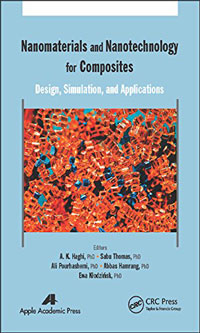| Posted: Mar 10, 2015 | |
Nanotechnology for composites: Design, simulation, and applications |
|
| (Nanowerk News) Engineered nanopolymer and nanoparticles, with their extraordinary mechanical and unique electronic properties, have garnered much attention in recent years. With a broad range of potential applications, including nanoelectronics, composites, chemical sensors, biosensors, microscopy, nanoelectromechanical systems, and many more, the scientific community is more motivated than ever to move beyond basic properties and explore the real issues associated with carbon nanotube-based applications. | |
 Engineered nanopolymer and nanoparticles are exceptionally interesting from a fundamental research point of view. They open up new perspectives for various applications, such as nano-transistors in circuits, field-emission displays, artificial muscles, or added reinforcements in alloys. This informative book is an introduction to the physical concepts needed for investigating carbon nanotubes and other one-dimensional solid-state systems. Written for a wide scientific readership, each chapter consists of an instructive approach to the topic and sustainable ideas for solutions. This new book "Nanomaterials and Nanotechnology for Composites: Design, Simulation, and Applications" Recommendations for future research are given by focusing on what each method has to learn from the nano-scale. The scope of the book is to provide current knowledge to support researchers entering the scientific area of carbon nanotubes and help them choose the appropriate modeling tool for accomplishing their study. |
|
| About the Authors | |
| A. K. Haghi, PhD, holds a BSc in urban and environmental engineering from University of North Carolina (USA); a MSc in mechanical engineering from North Carolina A&T State University (USA); a DEA in applied mechanics, acoustics, and materials from Université de Technologie de Compiègne (France); and a PhD in engineering sciences from Université de Franche-Comté (France). He is the author and editor of 165 books as well as 1000 published papers in various journals and conference proceedings. Dr. Haghi has received several grants, consulted for a number of major corporations, and is a frequent speaker to national and international audiences. Since 1983, he served as a professor at several universities. He is currently editor-in-chief of the International Journal of Chemoinformatics and Chemical Engineering and Polymers Research Journal and on the editorial boards of many international journals. He is a member of the Canadian Research and Development Center of Sciences and Cultures (CRDCSC), Montreal, Quebec, Canada. | |
| Dr. Sabu Thomas is the director of the School of Chemical Sciences, Mahatma Gandhi University, Kottayam, India. He is also a full professor of polymer science and engineering and the director of the International and Inter University Centre for Nanoscience and Nanotechnology of the same university. He is a fellow of many professional bodies. Professor Thomas has authored or co-authored many papers in international peer-reviewed journals in the area of polymer processing. He has organized several international conferences and has more than 420 publications, 11 books, and 2 patents to his credit. He has been involved in a number of books both as author and editor. He is a reviewer to many international journals and has received many awards for his excellent work in polymer processing. His h Index is 42. Professor Thomas is listed as the 5th position in the list of Most Productive Researchers in India, in 2008. | |
| Ali Pourhashemi, PhD, is currently a professor of chemical and biochemical engineering at Christian Brothers University (CBU) in Memphis, Tennessee. He was formerly the department chair at CBU and also taught at Howard University in Washington, DC. He taught various courses in chemical engineering, and his main area has been teaching the capstone process design as well as supervising industrial internship projects. He is a member of several professional organizations, including the American Institute of Chemical Engineers. He is on the international editorial review board of the International Journal of Chemoinformatics and Chemical Engineering and is an editorial member of the International of Journal of Advanced Packaging Technology. He has published many articles and presented at many professional conferences. | |
| Abbas Hamrang, PhD, is a professor of polymer science and technology. He is currently a senior polymer consultant and editor and member of the academic board of various international journals. His research interests include degradation studies of historical objects and archival materials, cellulose based plastics, thermogravemetric analysis, accelerated ageing process, and stabilisation of polymers by chemical and non-chemical methods. His previous involvement in academic and industry sectors at international level include deputy vice-chancellor of research & development, senior lecturer, manufacturing consultant, and science & technology advisor. | |
| Ewa Klodzinska holds a PhD from Nicolaus Copernicus University, Faculty of Chemistry in Torun, Poland. For ten years, she has been doing research on determination and identification of microorganisms using the electromigration techniques for the purposes of medical diagnosis. Currently she is working at the Institute for Engineering of Polymer Materials and Dyes and investigates surface characteristics of biodegradable polymer material on the basis of zeta potential measurements. She has written several original articles, monographs, and chapters in books for graduate students and scientists. She has made valuable contributions to the theory and practice of electromigration techniques, chromatography, sample preparation, and application of separation science in pharmaceutical and medical analysis. Dr. Ewa Klodzinska is a member of editorial board of ISRN Analytical Chemistry and the International Journal of Chemoinformatics and Chemical Engineering (IJCCE). |
| Source: Apple Academic Press |
